Bad dog breath, medically known as halitosis, is a common concern for many pet parents. While often dismissed as a minor annoyance, it can be a sign of underlying oral health issues. Fortunately, various dental cleaning products, including water additives and oral mouthwash, are available to help combat this problem and support your dog’s overall dental hygiene. These products act much like a daily mouthwash for humans, working to control plaque and tartar buildup and ultimately eliminate bad breath in dogs.
It’s crucial to understand that while these water additives are a valuable addition to a dog’s dental care regimen, they are not a substitute for regular weekly brushing or professional non-anesthetic dental cleanings. Instead, they serve as a supportive complement to a holistic dental care plan, enhancing the effectiveness of other at-home efforts.
How Water Additives Work to Combat Bad Breath
Dental water additives are formulated with enzymatic ingredients specifically designed to break down tartar and neutralize the bacteria that cause unpleasant breath. Many veterinary dental experts advocate for the daily use of a water additive (or dental rinse) in your dog’s drinking bowl to promote better oral health. This simple daily step can significantly contribute to fresher breath and a healthier mouth for your canine companion.
If your dog frequently suffers from bad breath, it’s essential to investigate the root cause. According to the American Kennel Club (AKC), several factors can contribute to stinky dog breath:
- Periodontal Disease: This is the most common cause of bad breath in dogs, resulting from plaque and tartar buildup leading to gum inflammation and infection.
- Poor Diet: Certain diets can contribute to bad breath, especially those lacking in dental-friendly ingredients or high in fermentable carbohydrates.
- Kidney Disease: A strong ammonia-like odor can indicate kidney problems, as the kidneys fail to filter toxins from the blood effectively.
- Liver Disease: A particularly foul, musty smell may be a sign of liver issues, as the liver struggles to detoxify the body.
- Diabetes: A sweet or fruity smell to your dog’s breath, often accompanied by increased thirst and urination, could indicate diabetes.
Understanding these potential causes can help you address your dog’s bad breath more effectively, often in consultation with your veterinarian.
Potential Side Effects of Water Additives for Dogs
While generally safe, some dogs may experience side effects when using dental water additives. One of the most common issues reported is digestive upset, which can manifest as soft stool or a general lack of appetite. In some cases, dogs may even refuse to drink their water altogether if they dislike the taste of the additive, potentially leading to dehydration.
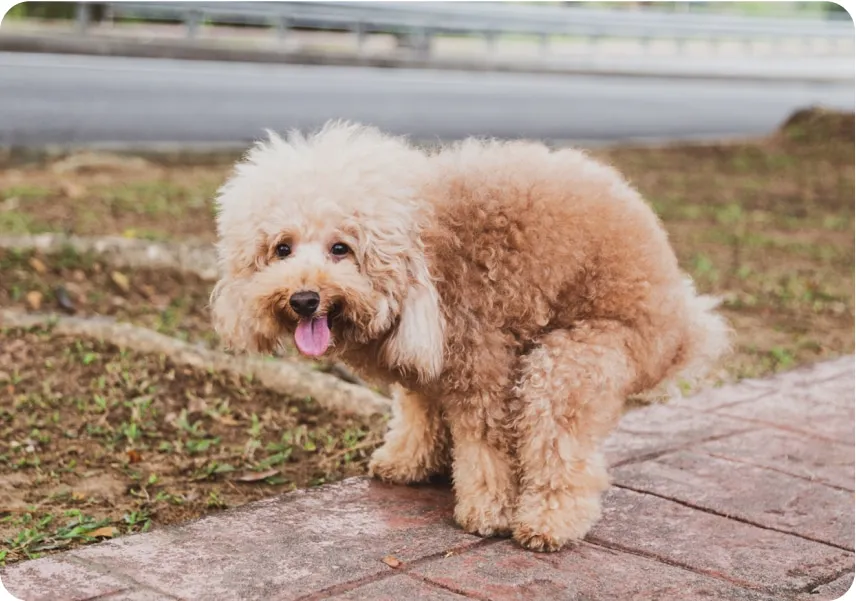 A graphic illustrating potential side effects of water additives, including digestive upset and lack of appetite.
A graphic illustrating potential side effects of water additives, including digestive upset and lack of appetite.
Dogs with pre-existing digestive sensitivities or stomach issues may not be good candidates for water additives. It is always best for pet parents to consult their veterinarian before introducing any new supplement or additive to their dog’s routine, particularly if their dog has known health concerns. This ensures the product is appropriate for your specific pet and helps prevent adverse reactions.
Pros and Cons of Using Water Additives for Dog Breath
Just like any dental care product, water additives come with their own set of advantages and disadvantages. Weighing these can help pet parents make an informed decision for their furry friends.
Pros
The primary benefit of dental water additives is their ease of use. Most come in a liquid form that can be effortlessly added to your dog’s daily drinking water. This simplicity makes them a convenient option for pet owners who may find daily tooth brushing challenging or time-consuming. One product on our list can even be applied as a gel, offering an alternative method of administration. This convenience is a major draw for maintaining consistent oral hygiene.
Cons
Despite their ease of use, water additives do have drawbacks. One significant concern is that some dogs may not enjoy the taste or scent of the additive. Our experts have noted instances where their own dogs turned their noses up at the treated water, refusing to drink it. This can lead to dehydration if not addressed promptly. Additionally, as mentioned, dogs with sensitive digestive systems may experience upset stomachs, leading to discomfort and potentially deterring owners from continued use. When considering options like these, pet parents should also be cautious about ingredients.
It is critically important for pet parents to thoroughly review the ingredients list of every brand of water additive they consider. Ensure that Xylitol is not included in the product. Xylitol is a sugar substitute commonly found in “sugar-free” chewing gum, mints, and occasionally in peanut butter. This ingredient is highly toxic to dogs and can cause a rapid drop in blood sugar, liver failure, and even death. The potential for such a severe reaction makes ingredient scrutiny paramount for your dog’s safety. Another important aspect of maintaining a healthy gut, which can indirectly impact overall health including dental, is choosing the right supplements. Exploring options like best probiotic for dogs vet recommended or understanding the difference between best probiotic and prebiotic for dogs can be beneficial.
Dogs with Advanced Gum Disease May Benefit
For dogs suffering from periodontal disease, oral mouthwash products can be particularly beneficial. These additives might help to reduce the bacterial load in the mouth, which contributes to the progression of gum disease and bad breath. By targeting these bacteria, water additives can support the overall health of the gums and teeth.
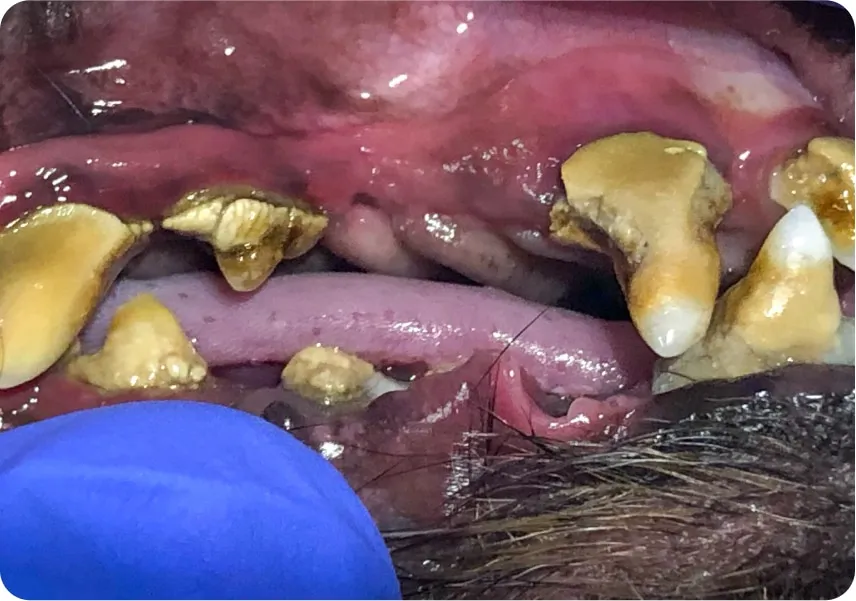 A dog with visible signs of advanced gum disease, illustrating the need for comprehensive dental care.
A dog with visible signs of advanced gum disease, illustrating the need for comprehensive dental care.
However, it is crucial to reiterate that even with advanced gum disease, water additives do not eliminate the need for brushing. Even brushing your dog’s teeth with just water can make a significant difference. Water additives should be seen as an additional tool in the fight against dental disease, not a standalone solution. Regular professional veterinary check-ups and cleanings remain the gold standard for managing and treating advanced gum disease. For dogs with sensitive stomachs, finding healthy dog treats for sensitive stomachs can also be part of a thoughtful routine.
6 Best Water Additives for Fresher Dog Breath
When selecting a water additive for your dog, always look for products that are approved by the Veterinary Oral Health Council (VOHC). VOHC acceptance signifies that a product meets specific standards for plaque and tartar control. Here are some of the top-rated water additives to consider:
1. TropiClean Fresh Breath Water Additive
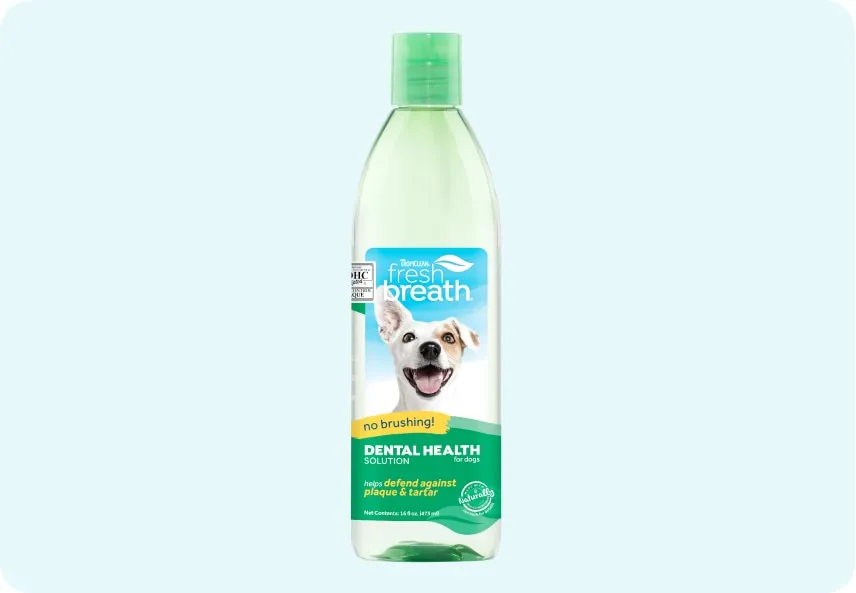 A bottle of TropiClean Fresh Breath Water Additive, highlighting its natural ingredients.
A bottle of TropiClean Fresh Breath Water Additive, highlighting its natural ingredients.
Why we like it: This additive utilizes the power of green tea, an ingredient known for its ability to combat plaque and tartar while actively fighting the bacteria responsible for bad breath. It’s a natural approach to keeping your dog’s mouth clean. Note that this product is recommended for stagnant water bowls and should not be used in water fountains, which might affect its efficacy or distribution.
2. Staff Favorite: Oxyfresh Water Additive
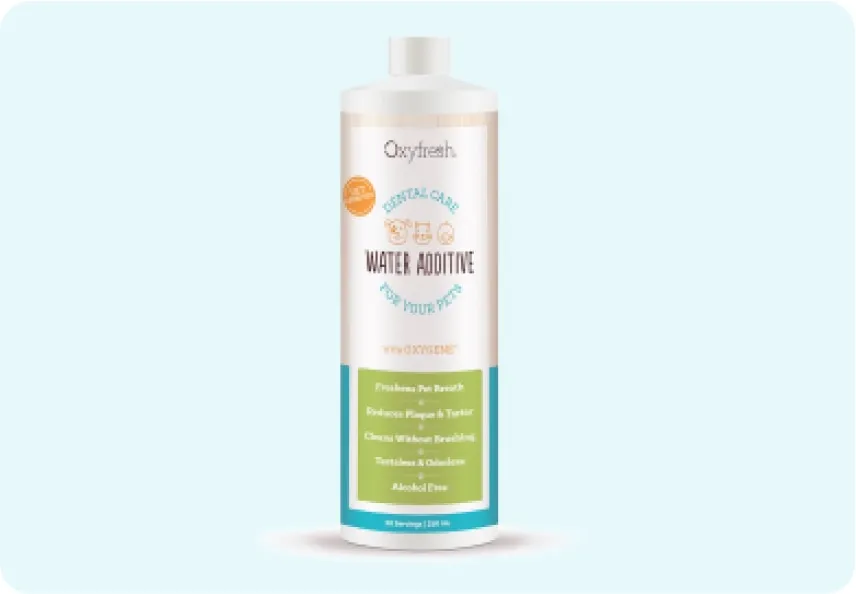 A bottle of Oxyfresh Water Additive, emphasizing its non-toxic formulation.
A bottle of Oxyfresh Water Additive, emphasizing its non-toxic formulation.
Why we like it: Oxyfresh stands out for being 100% non-toxic and effectively using Zinc to help eliminate bad breath. Many pet parents report that their dogs don’t even notice the additive in their water, making it an excellent choice for picky drinkers. Business Insider has rated this product as one of the best overall for dog dental care, a testament to its effectiveness and palatability.
3. Petlab Co. Dental Formula Water Additive
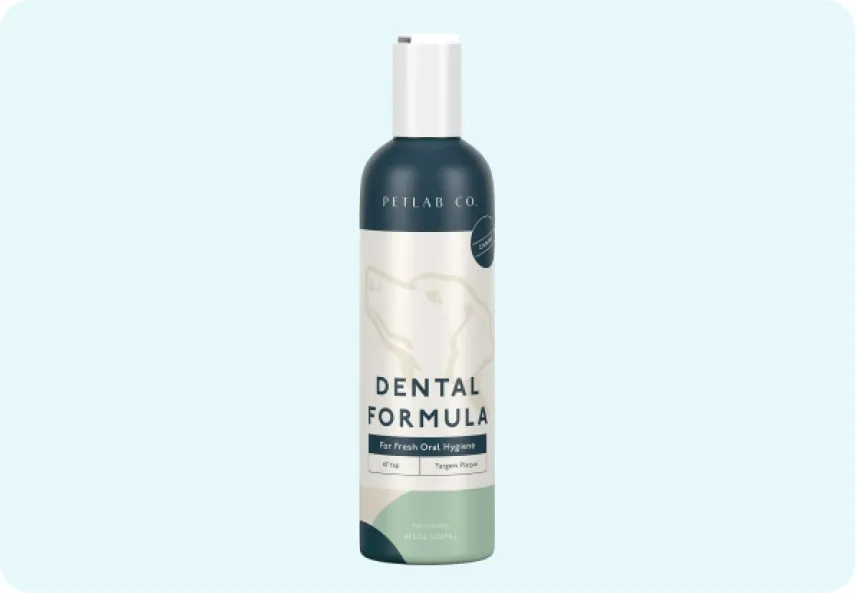 A bottle of Petlab Co. Dental Formula Water Additive, featuring its easy-to-use design.
A bottle of Petlab Co. Dental Formula Water Additive, featuring its easy-to-use design.
Why we like it: Petlab Co.’s formula is praised by pet parents for being odorless and remarkably easy to use. The brand recommends adding just one teaspoon of this canine dental formula to eight ounces of drinking water daily. For optimal results, a new teaspoon of the dental wash should be added to a clean bowl each day, ensuring consistent effectiveness.
4. Nylabone Advanced Oral Care Liquid Tartar Remover
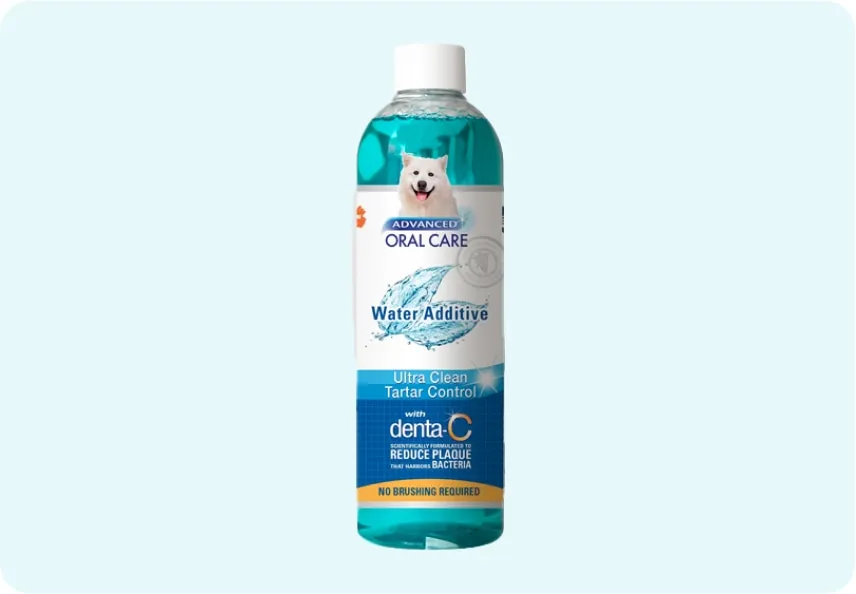 A bottle of Nylabone Advanced Oral Care Liquid Tartar Remover, indicating its focus on tartar control.
A bottle of Nylabone Advanced Oral Care Liquid Tartar Remover, indicating its focus on tartar control.
Why we like it: This Nylabone product is specifically formulated to alter the pH balance of a dog’s saliva, thereby effectively controlling tartar production and combating bad breath. It’s a targeted approach for preventing buildup. It’s important to note that this product is designed exclusively for dogs and is not suitable for cats, so caution is advised if you have feline companions in your household.
5. Staff Favorite: Virbac C.E.T Aquadent Dog & Cat Dental Solution
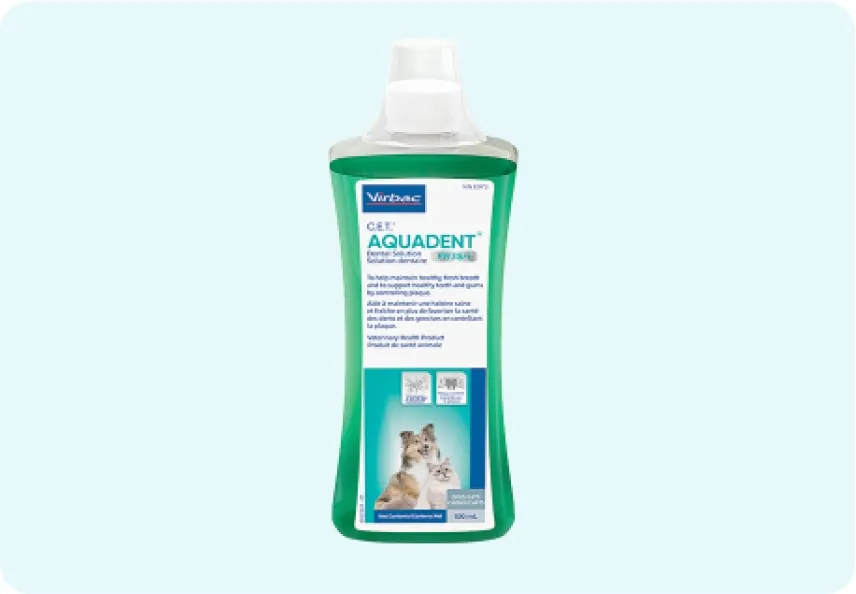 A bottle of Virbac C.E.T Aquadent Dog & Cat Dental Solution, highlighting its natural ingredients.
A bottle of Virbac C.E.T Aquadent Dog & Cat Dental Solution, highlighting its natural ingredients.
Why we like it: Virbac C.E.T Aquadent is a versatile solution that uses natural ingredients. It combines a natural sweetener (erythritol), a prebiotic, and a natural antioxidant (pomegranate) through Virbac’s innovative FR3SH Technology. Erythritol provides a pleasant taste, while pomegranate acts as a natural antioxidant that helps fight plaque and bacteria, making it suitable for both dogs and cats.
6. pet::ESSENTIAL™ HealthyMouth® with NutriNeeds™ by W. Jean Dodds, DVM
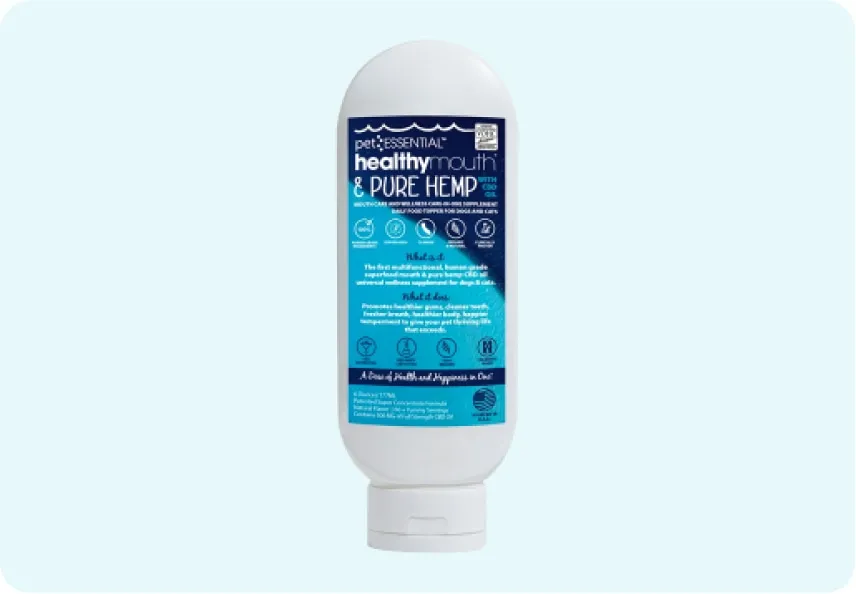 A bottle of HealthyMouth with NutriNeeds, certified by the Vet Oral Health Council.
A bottle of HealthyMouth with NutriNeeds, certified by the Vet Oral Health Council.
Why we like it: This product holds the prestigious certification from the Vet Oral Health Council (VOHC), underscoring its proven efficacy. Uniquely, it can also be applied as a gel, offering flexibility in administration. According to product literature, clinical trials demonstrate that plaque and bacterial reduction continue to improve with prolonged use, and any remaining plaque is significantly softened, enhancing the effectiveness of other dental care methods like brushing and dental chews.
Establishing a Comprehensive Home Dental Care Routine
While Water Additives For Dog Breath are beneficial, they are most effective when integrated into a comprehensive home dental care routine. This routine should include regular tooth brushing, providing a proper, dental-friendly diet, and offering appropriate chew toys designed to help scrape away plaque and reduce bacterial buildup in the mouth. Consistent home care is the foundation of good canine oral health.
Our expert staff also recommends supplementing daily routines with healthy chews and dental treats between professional cleaning appointments. Products such as canned chicken for dog with diarrhea or information on magnesium oil for dog arthritis may not directly relate to dental health but highlight the importance of holistic pet care. Incorporating water additives as part of your established home dental care routine can significantly strengthen the overall impact of your efforts, leading to a healthier mouth and fresher breath for your beloved pet.
In conclusion, addressing bad dog breath is a crucial aspect of pet care that goes beyond simple aesthetics. By understanding the causes, recognizing the role of water additives, and committing to a consistent home dental care routine, you can significantly improve your dog’s oral health and overall well-being. Always consult your veterinarian for personalized advice and to ensure the chosen products and routines are the best fit for your dog’s specific needs.
